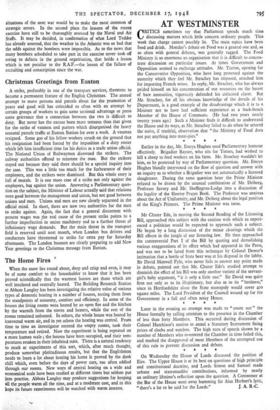AT WESTMINSTER
CRITICS sometimes say that Parliament spends much tima discussing matters which little concern ordinary people. This week that charge cannot possibly lie. The main topics have been food and drink. Monday's debate on Food was a general one and, as so often with general debates, was generally ragged. The Food Ministry is so enormous an organisation that it is difficult to concen- trate discussion on particular issues. At times Government and Opposition seemed to exchange attitudes. Mr. Turton, opening for the Conservative Opposition, who have long protested against the austerity which they feel Mr. Strachey has imposed, attacked him for importing French wines. In reply, Mr. Strachey, who has always prided himself on his concentration of our resources on the barest of bare necessities, vigorously defended his criticised claret. But Mr. Strachey, for all his obvious knowledge of the details of his Department, is a good example of the disadvantage which it is to a Minister not to have had sufficient experience as a back-bench Member of the House of Commons. (He had two years nearly twenty years ago.) Such a Minister finds it difficult to understand the House and its ways, as Mr. Strachey failed to do when he uttered the naïve, if truthful, observation that "the Ministry of Food does
not put anything into meat-pies." * * * * Earlier in the day, Mr. Etnrys Hughes used Parliamentary humour effectively. Brigadier Rayner, who sits for Totnes, had wished to kill a sheep to feed workers on his farm. Mr. Strachey wouldn't let him, so he protested by way of Parliamentary question. Mr. Emrys Hughes blandly intervened on the flow of question and answer with an inquiry as to whether a Brigadier was not automatically a licensed slaughterer. During the same question hour the Prime Minister refused to be drawn by the unusual combination of Mr. Driberg, Professor Savory and Mr. Skeffington-Lodge into a discussion of the legality of the Shorter Prayer Book. The Professor was anxious about the Act of Uniformity, and Mr. Driberg about the legal position of the King's Printers. The Prime Minister was terse. * * Mr Chuter Ede, in moving the Second Reading of the Licensing Bill, approached this subject with the caution with which so experi- enced a politician would be expected to approach such a subject. He began by a long discussion of the minor clearings which the Bill effects in the jungle of our licensing law. He then approached the controversial Part I of the Bill by quoting and demolishing various exaggerations of its effect which had appeared in the Press, and was not to be lured from this technique by Colonel Dower's intimation that a bottle of State beer was at his disposal in the lobby. Sir David Maxwell Fyfe, who never fails to answer any point made in debate, pointed out that Mr. Chuter Ecle's studied attempt to diminish the effect of his Bill was only another variant of the servant- girl's baby argument, "it is only a little one." Sir David was quite firm not only as to its illegitimacy, but also as to its "lustiness," since in Hertfordshire alone the State monopoly would cover 400 square miles. The Lord President of the Council wound up for the Government in a full and often noisy House. * * * * Later in the evening an attempt was made to "count out" the House formally by calling attention to the presence in the Chamber of less than forty Members. This occurred during discussion of Colonel Hutchison's motion to annul a Statutory Instrument fixing prices of clocks and watches. The high turn of speech shown by a number of Members who re-entered the Chamber in time foiled this, and marked the disapproval of most Members of the attempted use of this rule to prevent discussion and debate. * * On Wednesday the House of Lords discussed the position of Eire. The Upper House is at its best on questions of high principle and constitutional doctrine, and Lords Simon and Samuel made urbane and statesmanlike contributions, informed by nearly an ordinary lifetime's reflection upon the question. A Commoner at the Bar of the House went away humming Sir Alan Herbert's lyric,
"there's a lot to be said for the Lords." J. A. B.-C.


































 Previous page
Previous page